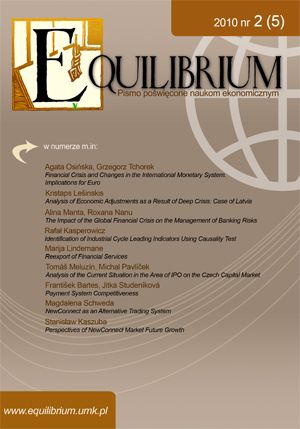Directions of changes in the functioning of economic instruments for environmental policy in Poland
DOI:
https://doi.org/10.12775/EQUIL.2010.030Keywords:
environmental policy, economic instruments for environmental policy, environmental taxes and charges, emission trading systemAbstract
Environmental policy instruments allow to incorporate the problem of using the natural resources into the decision-making process of individual agents. One of the most efficient instruments for environmental protection are economic instruments, the indirect methods of influence on agents? behavior. The aim of the article is to present the state of the Polish system of economic instruments in the light of other European countries? experiences (especially European Union countries) and perspectives in the use of economic instruments for environmental policy during the coming years. The study is based on the literature review, reports ordered by the Polish Ministry of Environment and publications published by The Organisation for Economic Co-operation and Development (OECD) and the European Environment Agency (EEA). The analysis suggests that economic instruments are widely used in Polish environmental policy. The main economic instruments in this policy are environmental charges and fines. Some of these charges and fines have been used in Polish environmental for several dozen years. Revenues from these instruments are earmarked for environmental expenditures. There are also some new, interesting economic instruments in Polish environmental policy, such as: deposit-refund systems, tradable energy certificates and emissions trading scheme. There are some opportunities for expanding the use of economic instruments for environmental policy in Poland. For example, there could be increased use of some environmental charges or taxes, and the environmental insurance. Poland could also implement an environmental tax reform.
Downloads
References
Directive 2001/80/EC of the European Parliament and of the Council of 23 October 2001 on the limitation of emissions of certain pollutants into the air from large combustion plants (OJ L 309, 27.11.2001).
Directive 2006/32/EC of the European Parliament and of the Council of 5 April 2006 on energy end-use efficiency and energy services and repealing Council Directive 93/76/EEC (OJ L 114, 27.4.2006).
Directive 2008/101/EC of the European Parliament and of the Council of 19 November 2008 amending Directive 2003/87/EC so as to include aviation activities in the scheme for greenhouse gas emission allowance trading within the Community (OJ L 8, 13.1.2009).
Directive 2009/29/EC of the European Parliament and of the Council of 23 April 2009 amending Directive 2003/87/EC so as to improve and extend the greenhouse gas emission allowance trading scheme of the Community (OJ L 140, 5.6.2009).
Draniewicz B. (2004), Ocena charakteru prawnego opłaty depozytowej, ?Ochrona Środowiska. Przegląd?, nr 3.
Draniewicz B. (2005), Przegląd wybranych instrumentów ochrony środowiska, ?Prawo i Środowisko?, nr 4.
Dybiec M. (2005), Subsydia szkodliwe dla środowiska w Polsce ? próba identyfikacji, Instytut na rzecz Ekorozwoju (not published paper).
Energy Efficiency Act (draft, 16th of July 2009).
Fiedor B., Famielec J., Górka K., Graczyk A., Poskrobko B., Stodulski W., Żylicz T. (2003), Koncepcja modyfikacji systemu instrumentów ekonomicznych dla ochrony środowiska, Projekt sfinansowany ze środków Narodowego Funduszu Ochrony Środowiska i Gospodarki Wodnej na zamówienie Ministra Środowiska, Akademia Ekonomiczna we Wrocławiu, Wrocław.
Fiedor B., Graczyk A. (2002), Ogólna charakterystyka instrumentów ekonomicznych w ochronie środowiska, [w:] B. Fiedor (red.), Podstawy ekonomii środowiska i zasobów naturalnych, Wydawnictwo C.H. Beck, Warszawa.
Fiedor B., Stodulski W. (2003), Instrumenty ekonomiczno-finansowe ochrony środowiska w krajach Unii Europejskiej, w: T. Borys (red.), Finansowanie ochrony środowiska w Polsce w kontekście standardów Unii Europejskiej, Wojewódzki Fundusz Ochrony Środowiska i Gospodarki Wodnej we Wrocławiu, Wrocław.
Górka K. (1993), Analiza porównawcza opłat i podatków ekologicznych w Polsce i w krajach gospodarki rynkowej, [w:] K. Górka (red.), Ekonomika ochrony środowiska naturalnego, Biblioteka ?Ekonomia i Środowisko? nr 14, Kraków.
Green Paper on Market-Based Instruments for Environment and Related Policy Purposes, COM(2007) 140 final.
Hollinger P. (2009), Sarkozy Calls for Carbon Tax on Imports, http://www.ft.com/cms/s/0/a5fb6084-9e32-11de-b0aa-00144feabdc0.html (12th of September).
Market-Based Instruments for Environmental Policy in Europe (2005), European Environmental Agency, Copenhagen.
Mechanizm wspólnych wdrożeń (JI) (2009), http://kashue.eu/serwis/index.php?page=ji (10th of September).
Opschoor J.B., Vos H.B. (1990), Instrumenty ekonomiczne dla ochrony środowiska, OECD, MOŚZNiL, Warszawa.
Panasiewicz A. (2005), Możliwości rozwoju ubezpieczeń ekologicznych w Polsce na tle niemieckiego rynku ubezpieczeń ekologicznych, [w:] T. Borys (red.), ?Gospodarka a Środowisko?, Prace Naukowe nr 1075 Akademii Ekonomicznej we Wrocławiu, Wydawnictwo Akademii Ekonomicznej we Wrocławiu, Wrocław.
Poskrobko B. (2007), Instrumenty ekonomiczne, [w:] B. Poskrobko (red.), Zarządzanie środowiskiem, PWE, Warszawa.
Radecki W. (2002), Środki finansowo-prawne. Komentarze do ustawy ? Prawo ochrony środowiska, Towarzystwo Naukowe Prawa Ochrony Środowiska, Wrocław.
Śleszyński J. (2000), Ekonomiczne problemy ochrony środowiska, Aries, Warszawa.
Speck S., Andersen M., Nielsen H., Ryelund A., Smith C. (2006), The Use of Economic Instruments in Nordic and Baltic Environmental Policy 2001-2005, Nordic Council of Ministers, Copenhagen.
System of balancing and accounting for emissions of sulphur dioxide (SO2) and nitrogen oxides (NOx) from large combustion plants act (draft, 17th of July 2009).
Szpiganowicz P. (2008), Bilans osiągnięć planowanego systemu, ?Energia Elektryczna?, nr 3.
Taxation Trends in the European Union (2009), Eurostat, Luxemburg.
The OECD/EEA Database on Instruments used for Environmental Policy and Natural Resources Management (2009), http://www2.oecd.org/ecoinst/ queries/index.htm (10th of September).
Vos H., Barde J-P., Mountford H. (1999), Economic Instruments for Pollution Control and Natural Resources Management in OECD Countries: A Survey, OECD, Paris.
Wallart N. (1999), The Political Economy of Environmental Taxes, Edward Elgar Publishing Limited, Cheltenham.
Żmijewski K. (2007), Białe certyfikaty ? instrukcja obsługi systemu, ?Czysta Energia?, nr 11.






